外研版(2019)选择性必修 第四册 Unit 2 Lessons in life Using language课件(共28张)
文档属性
| 名称 | 外研版(2019)选择性必修 第四册 Unit 2 Lessons in life Using language课件(共28张) |
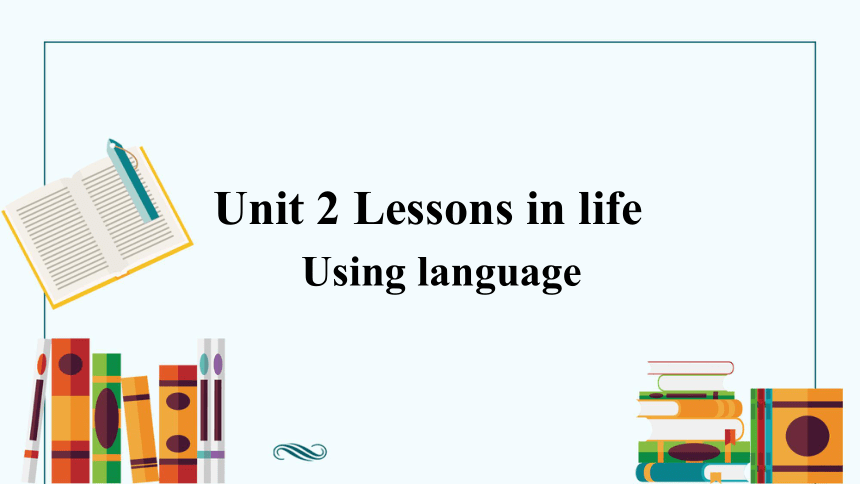
|
|
| 格式 | pptx | ||
| 文件大小 | 1.4MB | ||
| 资源类型 | 教案 | ||
| 版本资源 | 外研版(2019) | ||
| 科目 | 英语 | ||
| 更新时间 | 2025-05-02 20:25:27 | ||
图片预览

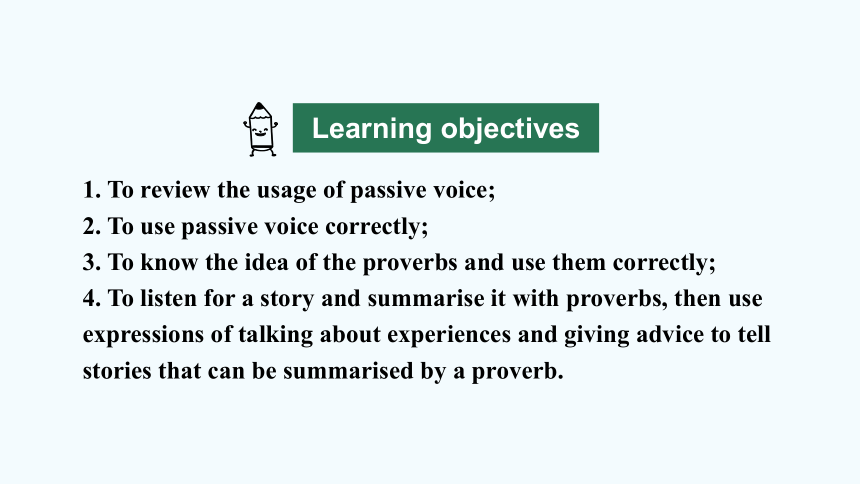
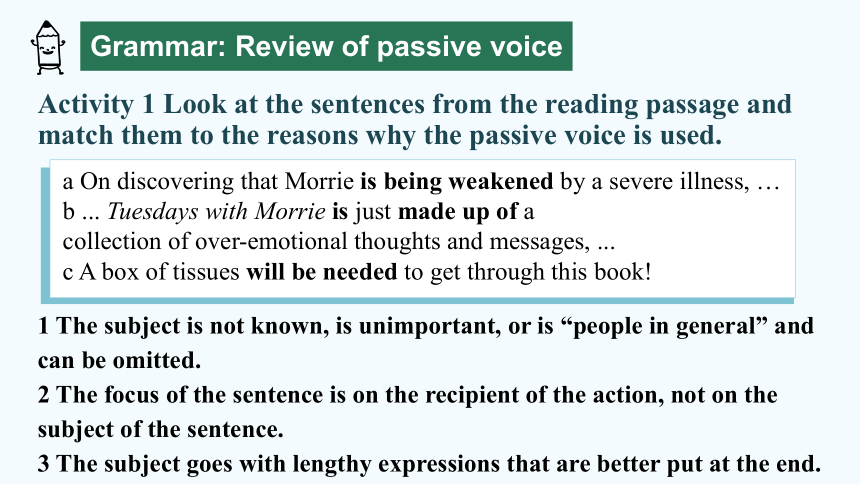
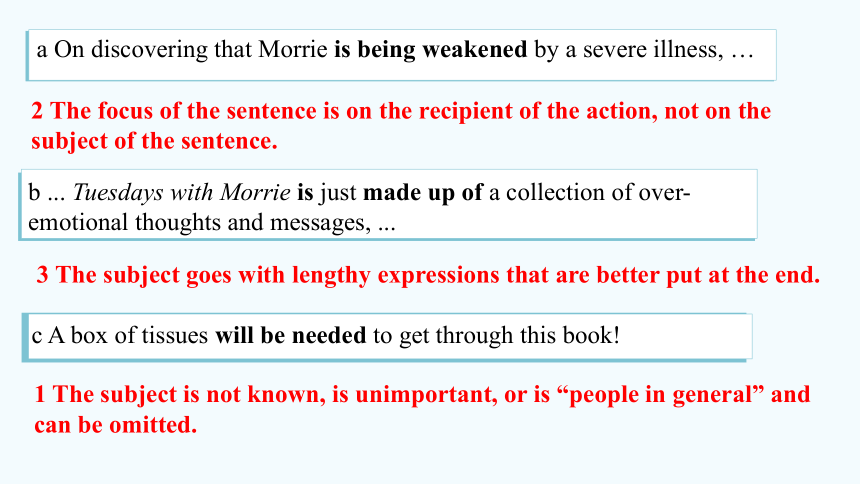
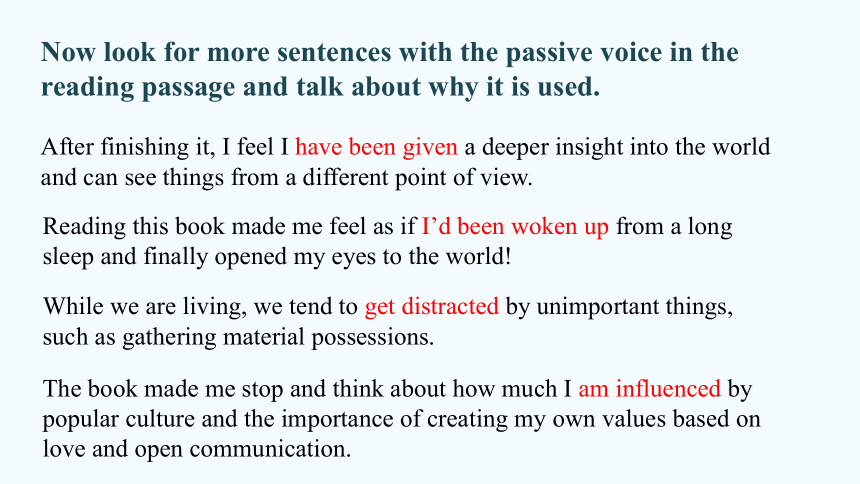

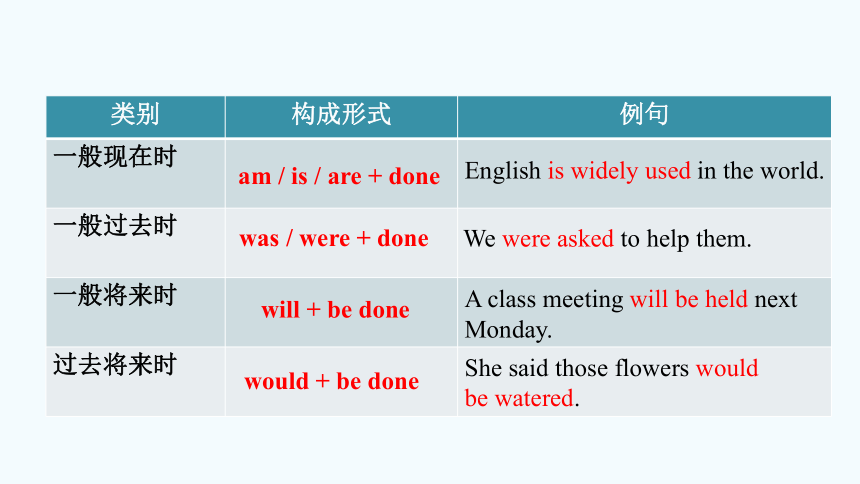
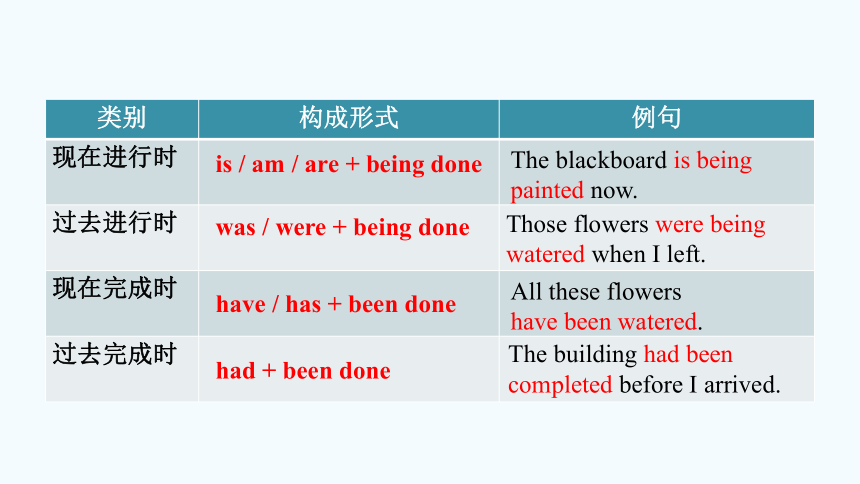
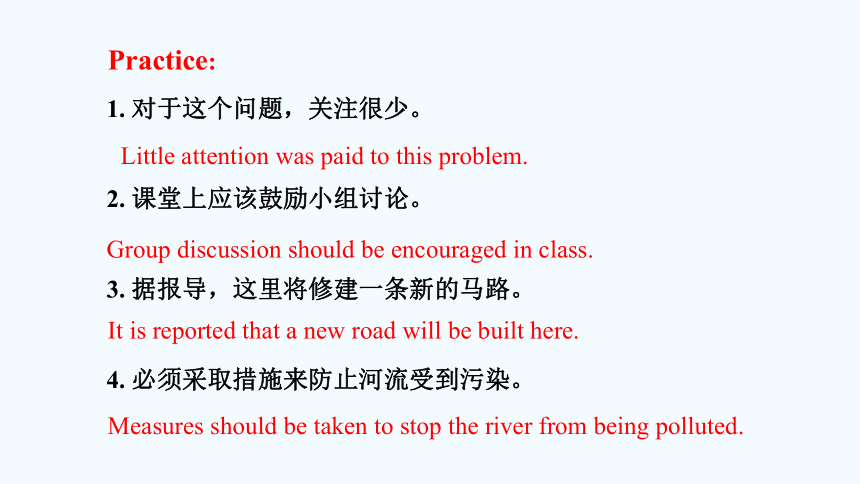
文档简介
(共28张PPT)
Using language
Unit 2 Lessons in life
Learning objectives
1. To review the usage of passive voice;
2. To use passive voice correctly;
3. To know the idea of the proverbs and use them correctly;
4. To listen for a story and summarise it with proverbs, then use expressions of talking about experiences and giving advice to tell stories that can be summarised by a proverb.
a On discovering that Morrie is being weakened by a severe illness, …
b ... Tuesdays with Morrie is just made up of a
collection of over-emotional thoughts and messages, ...
c A box of tissues will be needed to get through this book!
Activity 1 Look at the sentences from the reading passage and match them to the reasons why the passive voice is used.
Grammar: Review of passive voice
1 The subject is not known, is unimportant, or is “people in general” and can be omitted.
2 The focus of the sentence is on the recipient of the action, not on the subject of the sentence.
3 The subject goes with lengthy expressions that are better put at the end.
a On discovering that Morrie is being weakened by a severe illness, …
2 The focus of the sentence is on the recipient of the action, not on the subject of the sentence.
b ... Tuesdays with Morrie is just made up of a collection of over-emotional thoughts and messages, ...
3 The subject goes with lengthy expressions that are better put at the end.
c A box of tissues will be needed to get through this book!
1 The subject is not known, is unimportant, or is “people in general” and can be omitted.
Now look for more sentences with the passive voice in the reading passage and talk about why it is used.
After finishing it, I feel I have been given a deeper insight into the world and can see things from a different point of view.
While we are living, we tend to get distracted by unimportant things, such as gathering material possessions.
Reading this book made me feel as if I’d been woken up from a long sleep and finally opened my eyes to the world!
The book made me stop and think about how much I am influenced by popular culture and the importance of creating my own values based on love and open communication.
动词的语态 (voices)
动词语态有两种:主动语态和被动语态。
主语是动作的发出者为主动语态;
主语是动作的接受者为被动语态。
被动语态谓语部分结构:be + v.pp
类别 构成形式 例句
一般现在时
一般过去时
一般将来时
过去将来时
am / is / are + done
was / were + done
will + be done
would + be done
English is widely used in the world.
We were asked to help them.
A class meeting will be held next Monday.
She said those flowers would be watered.
类别 构成形式 例句
现在进行时
过去进行时
现在完成时
过去完成时
is / am / are + being done
was / were + being done
have / has + been done
had + been done
The blackboard is being painted now.
Those flowers were being watered when I left.
All these flowers have been watered.
The building had been completed before I arrived.
Practice:
1. 对于这个问题,关注很少。
2. 课堂上应该鼓励小组讨论。
3. 据报导,这里将修建一条新的马路。
4. 必须采取措施来防止河流受到污染。
Little attention was paid to this problem.
Group discussion should be encouraged in class.
It is reported that a new road will be built here.
Measures should be taken to stop the river from being polluted.
Activity 2 Rewrite the paragraph using the passive voice where appropriate.
Since ancient times, storytelling has been a way to share and pass on wisdom. One important early work that did so was Aesop’s Fables, a collection of stories that history credits to Aesop, a Greek storyteller. People believe that he lived in Ancient Greece between 620 BC and 564 BC. Most of the characters in his stories are animals, the qualities of which Aesop used to reflect human traits and wisdom. Each fable teaches a life lesson that Aesop summarises in a short phrase at the end of the story, called a moral.
Today, children and adults all around the world still enjoy Aesop’s Fables .Since ancient times, storytelling has been a way to share and pass on wisdom. One important early work that did so was Aesop’s Fables, a collection of stories that is credited to Aesop, a Greek storyteller. It is believed that Aesop lived in Ancient Greece between 620 BC and 564 BC. Most of the characters in his stories are animals, the qualities of which were used to reflect human traits and wisdom by Aesop. Each fable teaches a life lesson that is summarised in a short phrase at the end of the story, called a moral. Today, Aesop’s Fables is still enjoyed by children and adults all around the world.
Activity 3 Look at the pictures and write the story from Aesop’s Fables. Use the passive voice where appropriate.
One day a little mouse was caught by a lion. The lion wanted to eat the mouse, but the mouse said that he would help the lion someday, if he was let to go. The lion thought, “How can a great animal be helped by a little animal ” But the mouse was allowed to leave.
Several days later, the lion was caught by a hunter’s net. The mouse bit the net with his strong teeth and helped the lion out. Thanks to the little mouse, the lion was saved and finally admitted that the strong could sometimes be helped by the weak.
Activity 4 Work in pairs. Tell each other another fable you know and the lesson you have learnt from it. Use the passive voice where appropriate.
Activity 5 Listen and complete the conversation.
1
A: Professor Brown, here’s my term paper. Sorry for the delay.
B: That’s OK.1__________________, right
Better late than never
2
A: Maths is really killing me! I’m thinking of giving it up.
B: 2_______________ You’ll never get your dream job as a market analyst if you don’t stick to it.
No pain, no gain.
Proverbs about life
3
A: If you want to lose weight, you need to stop eating junk food, and you need to start exercising.
B: OK. I’ll start tomorrow ... maybe.
A: Today. Not tomorrow. 3____________________________________________
Never put off until tomorrow what you can do today.
4
A: I’m glad you finally got here.
B: My car had a flat tyre on the way. Anyway, 3_____________________.
all’s well that ends well
5
A: With my brother’s help, I finally completed my biology project!
B: Congratulations! 5 _________________________
Two heads are better than one.
6
A: I heard that Mary is going to invest all her money in this programme.
B: That’s not wise. As people usually say, “6 _____________________
_________________________”. I’ll talk to her as soon as possible.
Don’t put all of your eggs in one basket
Activity 6 Match the proverbs in Activity 5 to their meanings.
1_______________: you must face challenges in order to be successful.
2 _________________________: it is easier to achieve something if you cooperate with someone else
3___________________: doing something late is better than not doing it at all
4 ____________________________________________: you should start things earlier rather than later
5__________________________________: do not put all your efforts or resources into doing one thing
6______________________: problems don’t matter if the final result is good
No pain, no gain.
Two heads are better than one.
Better late than never
Never put off until tomorrow what you can do today.
Don’t put all of your eggs in one basket
All’s well that ends well
Now work in groups and think of other proverbs about life. Can you find Chinese proverbs with similar meanings
Rome was not built in a day.
A slow sparrow should make an early start.
A friend in need is a friend indeed.
A bird is known by its note, and a man by his talk.
Practice makes perfect.
罗马并非一日建成。
笨鸟先飞
患难见真情。
闻其歌知其鸟, 听其言知其人。
熟能生巧。
Activity 7 Work in pairs. Think of other situations to which these proverbs can be applied.
Did you know
In most countries, the average age for starting university is 18 years old, but actually there is no upper age limit for starting a university degree. Recently, there has been an increase in the number of mature students going to university, after working for a few or many years. The oldest person to get a Cambridge MA received his law degree at the age of 102. In China, a man from Jiangsu Province graduated from university at the age of 88, making him the oldest university graduate in the country.
Listening & speaking
Activity 8 Listen to the interview and choose the best headline.
1 University Fees Are No Barrier to Grandma!
2 Dream Comes True for Graduating Grandma
3 Janet Says: “Family first! That’s what matters!”
4 How the Student Experience Has Changed with the Centuries
Activity 9 Listen again and complete the notes.
Interview with Janet Rose
Age: 1_____________
First attended university in: 2______________
Reason for leaving university: 3__________________
Reason for going back to university: 4__________________
Initial feelings on returning to university 5_________________
University major: 6_____________
Feelings on graduation: 7_________________
Advice to others: 8_________________
Future plans: 9.____________________
Interview with Janet Rose
Age: 1__________
First attended university in: 2______________
Reason for leaving university:
3_____________________________________________
Reason for going back to university: 4________________________
_______________________________________________________
81
1955
She took care of her ill mother and helped her father.
Her daughter suggested she go back to school five years ago and she jumped at the chance.
Initial feelings on returning to university:
5________________________________________
University major: 6_________________
Feelings on graduation: 7______________
Advice to others: 8________________________
Future plans: 9______________________________
She felt a bit nervous at first and she felt so old.
American literature.
She feels great.
You’re never too old to learn.
Starting a master’s degree in the fall.
Now work in pairs and talk about what you can learn from Janet’s story.
I started ... back in ...
After that I ...
But then five years ago ...
I felt ... at first.
I suggest that ...
Remember, ...
Activity 10 Complete the boxes with the expressions from the interview.
Talking about experiences
I started ... back in ...
After that I ...
But then five years ago ...
I felt ... at first.
Giving advice
I suggest that ...
Remember, ...
Activity 11 Work in pairs. Tell each other a story about yourself that can be summarized by a proverb in this section.
Now talk about how effectively you and your partner used your own experiences to illustrate your understanding of the proverbs.
1. Summarize the usage of passive voice and do the relevant exercises.
2. Write a passage using your own experience to illustrate your understanding of the proverbs you’ve learnt today.
Homework
Using language
Unit 2 Lessons in life
Learning objectives
1. To review the usage of passive voice;
2. To use passive voice correctly;
3. To know the idea of the proverbs and use them correctly;
4. To listen for a story and summarise it with proverbs, then use expressions of talking about experiences and giving advice to tell stories that can be summarised by a proverb.
a On discovering that Morrie is being weakened by a severe illness, …
b ... Tuesdays with Morrie is just made up of a
collection of over-emotional thoughts and messages, ...
c A box of tissues will be needed to get through this book!
Activity 1 Look at the sentences from the reading passage and match them to the reasons why the passive voice is used.
Grammar: Review of passive voice
1 The subject is not known, is unimportant, or is “people in general” and can be omitted.
2 The focus of the sentence is on the recipient of the action, not on the subject of the sentence.
3 The subject goes with lengthy expressions that are better put at the end.
a On discovering that Morrie is being weakened by a severe illness, …
2 The focus of the sentence is on the recipient of the action, not on the subject of the sentence.
b ... Tuesdays with Morrie is just made up of a collection of over-emotional thoughts and messages, ...
3 The subject goes with lengthy expressions that are better put at the end.
c A box of tissues will be needed to get through this book!
1 The subject is not known, is unimportant, or is “people in general” and can be omitted.
Now look for more sentences with the passive voice in the reading passage and talk about why it is used.
After finishing it, I feel I have been given a deeper insight into the world and can see things from a different point of view.
While we are living, we tend to get distracted by unimportant things, such as gathering material possessions.
Reading this book made me feel as if I’d been woken up from a long sleep and finally opened my eyes to the world!
The book made me stop and think about how much I am influenced by popular culture and the importance of creating my own values based on love and open communication.
动词的语态 (voices)
动词语态有两种:主动语态和被动语态。
主语是动作的发出者为主动语态;
主语是动作的接受者为被动语态。
被动语态谓语部分结构:be + v.pp
类别 构成形式 例句
一般现在时
一般过去时
一般将来时
过去将来时
am / is / are + done
was / were + done
will + be done
would + be done
English is widely used in the world.
We were asked to help them.
A class meeting will be held next Monday.
She said those flowers would be watered.
类别 构成形式 例句
现在进行时
过去进行时
现在完成时
过去完成时
is / am / are + being done
was / were + being done
have / has + been done
had + been done
The blackboard is being painted now.
Those flowers were being watered when I left.
All these flowers have been watered.
The building had been completed before I arrived.
Practice:
1. 对于这个问题,关注很少。
2. 课堂上应该鼓励小组讨论。
3. 据报导,这里将修建一条新的马路。
4. 必须采取措施来防止河流受到污染。
Little attention was paid to this problem.
Group discussion should be encouraged in class.
It is reported that a new road will be built here.
Measures should be taken to stop the river from being polluted.
Activity 2 Rewrite the paragraph using the passive voice where appropriate.
Since ancient times, storytelling has been a way to share and pass on wisdom. One important early work that did so was Aesop’s Fables, a collection of stories that history credits to Aesop, a Greek storyteller. People believe that he lived in Ancient Greece between 620 BC and 564 BC. Most of the characters in his stories are animals, the qualities of which Aesop used to reflect human traits and wisdom. Each fable teaches a life lesson that Aesop summarises in a short phrase at the end of the story, called a moral.
Today, children and adults all around the world still enjoy Aesop’s Fables .Since ancient times, storytelling has been a way to share and pass on wisdom. One important early work that did so was Aesop’s Fables, a collection of stories that is credited to Aesop, a Greek storyteller. It is believed that Aesop lived in Ancient Greece between 620 BC and 564 BC. Most of the characters in his stories are animals, the qualities of which were used to reflect human traits and wisdom by Aesop. Each fable teaches a life lesson that is summarised in a short phrase at the end of the story, called a moral. Today, Aesop’s Fables is still enjoyed by children and adults all around the world.
Activity 3 Look at the pictures and write the story from Aesop’s Fables. Use the passive voice where appropriate.
One day a little mouse was caught by a lion. The lion wanted to eat the mouse, but the mouse said that he would help the lion someday, if he was let to go. The lion thought, “How can a great animal be helped by a little animal ” But the mouse was allowed to leave.
Several days later, the lion was caught by a hunter’s net. The mouse bit the net with his strong teeth and helped the lion out. Thanks to the little mouse, the lion was saved and finally admitted that the strong could sometimes be helped by the weak.
Activity 4 Work in pairs. Tell each other another fable you know and the lesson you have learnt from it. Use the passive voice where appropriate.
Activity 5 Listen and complete the conversation.
1
A: Professor Brown, here’s my term paper. Sorry for the delay.
B: That’s OK.1__________________, right
Better late than never
2
A: Maths is really killing me! I’m thinking of giving it up.
B: 2_______________ You’ll never get your dream job as a market analyst if you don’t stick to it.
No pain, no gain.
Proverbs about life
3
A: If you want to lose weight, you need to stop eating junk food, and you need to start exercising.
B: OK. I’ll start tomorrow ... maybe.
A: Today. Not tomorrow. 3____________________________________________
Never put off until tomorrow what you can do today.
4
A: I’m glad you finally got here.
B: My car had a flat tyre on the way. Anyway, 3_____________________.
all’s well that ends well
5
A: With my brother’s help, I finally completed my biology project!
B: Congratulations! 5 _________________________
Two heads are better than one.
6
A: I heard that Mary is going to invest all her money in this programme.
B: That’s not wise. As people usually say, “6 _____________________
_________________________”. I’ll talk to her as soon as possible.
Don’t put all of your eggs in one basket
Activity 6 Match the proverbs in Activity 5 to their meanings.
1_______________: you must face challenges in order to be successful.
2 _________________________: it is easier to achieve something if you cooperate with someone else
3___________________: doing something late is better than not doing it at all
4 ____________________________________________: you should start things earlier rather than later
5__________________________________: do not put all your efforts or resources into doing one thing
6______________________: problems don’t matter if the final result is good
No pain, no gain.
Two heads are better than one.
Better late than never
Never put off until tomorrow what you can do today.
Don’t put all of your eggs in one basket
All’s well that ends well
Now work in groups and think of other proverbs about life. Can you find Chinese proverbs with similar meanings
Rome was not built in a day.
A slow sparrow should make an early start.
A friend in need is a friend indeed.
A bird is known by its note, and a man by his talk.
Practice makes perfect.
罗马并非一日建成。
笨鸟先飞
患难见真情。
闻其歌知其鸟, 听其言知其人。
熟能生巧。
Activity 7 Work in pairs. Think of other situations to which these proverbs can be applied.
Did you know
In most countries, the average age for starting university is 18 years old, but actually there is no upper age limit for starting a university degree. Recently, there has been an increase in the number of mature students going to university, after working for a few or many years. The oldest person to get a Cambridge MA received his law degree at the age of 102. In China, a man from Jiangsu Province graduated from university at the age of 88, making him the oldest university graduate in the country.
Listening & speaking
Activity 8 Listen to the interview and choose the best headline.
1 University Fees Are No Barrier to Grandma!
2 Dream Comes True for Graduating Grandma
3 Janet Says: “Family first! That’s what matters!”
4 How the Student Experience Has Changed with the Centuries
Activity 9 Listen again and complete the notes.
Interview with Janet Rose
Age: 1_____________
First attended university in: 2______________
Reason for leaving university: 3__________________
Reason for going back to university: 4__________________
Initial feelings on returning to university 5_________________
University major: 6_____________
Feelings on graduation: 7_________________
Advice to others: 8_________________
Future plans: 9.____________________
Interview with Janet Rose
Age: 1__________
First attended university in: 2______________
Reason for leaving university:
3_____________________________________________
Reason for going back to university: 4________________________
_______________________________________________________
81
1955
She took care of her ill mother and helped her father.
Her daughter suggested she go back to school five years ago and she jumped at the chance.
Initial feelings on returning to university:
5________________________________________
University major: 6_________________
Feelings on graduation: 7______________
Advice to others: 8________________________
Future plans: 9______________________________
She felt a bit nervous at first and she felt so old.
American literature.
She feels great.
You’re never too old to learn.
Starting a master’s degree in the fall.
Now work in pairs and talk about what you can learn from Janet’s story.
I started ... back in ...
After that I ...
But then five years ago ...
I felt ... at first.
I suggest that ...
Remember, ...
Activity 10 Complete the boxes with the expressions from the interview.
Talking about experiences
I started ... back in ...
After that I ...
But then five years ago ...
I felt ... at first.
Giving advice
I suggest that ...
Remember, ...
Activity 11 Work in pairs. Tell each other a story about yourself that can be summarized by a proverb in this section.
Now talk about how effectively you and your partner used your own experiences to illustrate your understanding of the proverbs.
1. Summarize the usage of passive voice and do the relevant exercises.
2. Write a passage using your own experience to illustrate your understanding of the proverbs you’ve learnt today.
Homework
